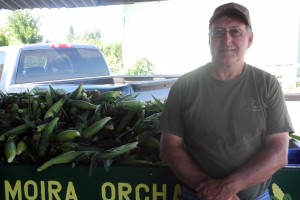Lack of rain is a disaster for local farmers
By Tyson Leonard

BELLEVILLE (25/07/12) Norman McCaw is the co-owner of McCaw Farms with his son. They grow corn, soybeans, blueberries, and other market vegetables. Photo by Tyson Leonard.
The recent lack of rain is a disaster in the making, says an agriculture expert.
“The government needs to declare this a disaster,” said Bette Jean Crews, a director on the provincial board of the Ontario Federation of Agriculture.
Crews said this is more than just a dry summer.
The government needs to implement the relief programs that come with a disaster label, so farmers will have a chance to survive this season, said Crews.
Some of the crops most affected by the lack of rain are field crops like soybeans and field corn.
“This drought has happened in the most important part of (the field corn and soybean) season,” said Crews.
Norman McCaw is co-owner of McCaw Farms in Frankford. He grows corn, soybeans, blueberries and other market vegetables.
“(The lack of rain) really affected the grain corn more than anything else,” said McCaw.
Grain corn is used for cattle fodder whereas sweet corn is the common market variety of corn.
“I think we are expecting rain tonight so that’s going to save our sweet corn crop from here on in,” said McCaw.
McCaw said the crops he did irrigate were surviving the lack of rain well.
“We have had an exceptional blueberry crop, the best I’ve ever seen, but we did irrigate them,” said McCaw.
Crews said not all farmers can afford to irrigate and even if they can its not the same as rain.
“For horticulture crops, like fruits and vegetables, we can irrigate, but even the irrigation isn’t the same as natural rain,” said Crews.
Crews said if the rain doesn’t come soon then even the irrigation ponds some farmers use will start to dry up.
“We’re having to constantly put water on, so its really taxing our financial resources,” said Stephen Laing, farm manager at Fiddlehead Farm in Demorestville.
Laing said the lack of rain has already affected the farm’s income and it could get worse if there isn’t rain soon.
Fiddlehead Farm focuses on growing market vegetables such as lettuce, kale, broccoli, and beets. The farm sells the vegetables through local markets and their community supported agricultural shares, in which the farm provides a weekly box of produce for a one-time fee at the beginning of the season.
“The most apparent issue is stunting. A lot of crops I am getting are on the smaller side,” said Laing.
Laing said he doesn’t want to plant much more until he is sure there will be enough rain to support everything.
“I’ve been holding off on crops that are due to go in the ground, so I’ve got a full greenhouse of things that need to be planted but can’t right now because there is very little possibility they would survive out of a greenhouse setting,” said Laing.
Laing said for now his crops will have to rely on irrigation techniques like drip tape. Drip tape is a system of plastic hoses laid at the base of plants with small holes that emit water. Laing said laying drip trip takes up valuable time needed elsewhere on the farm though.
 Print This Post
Print This Post






